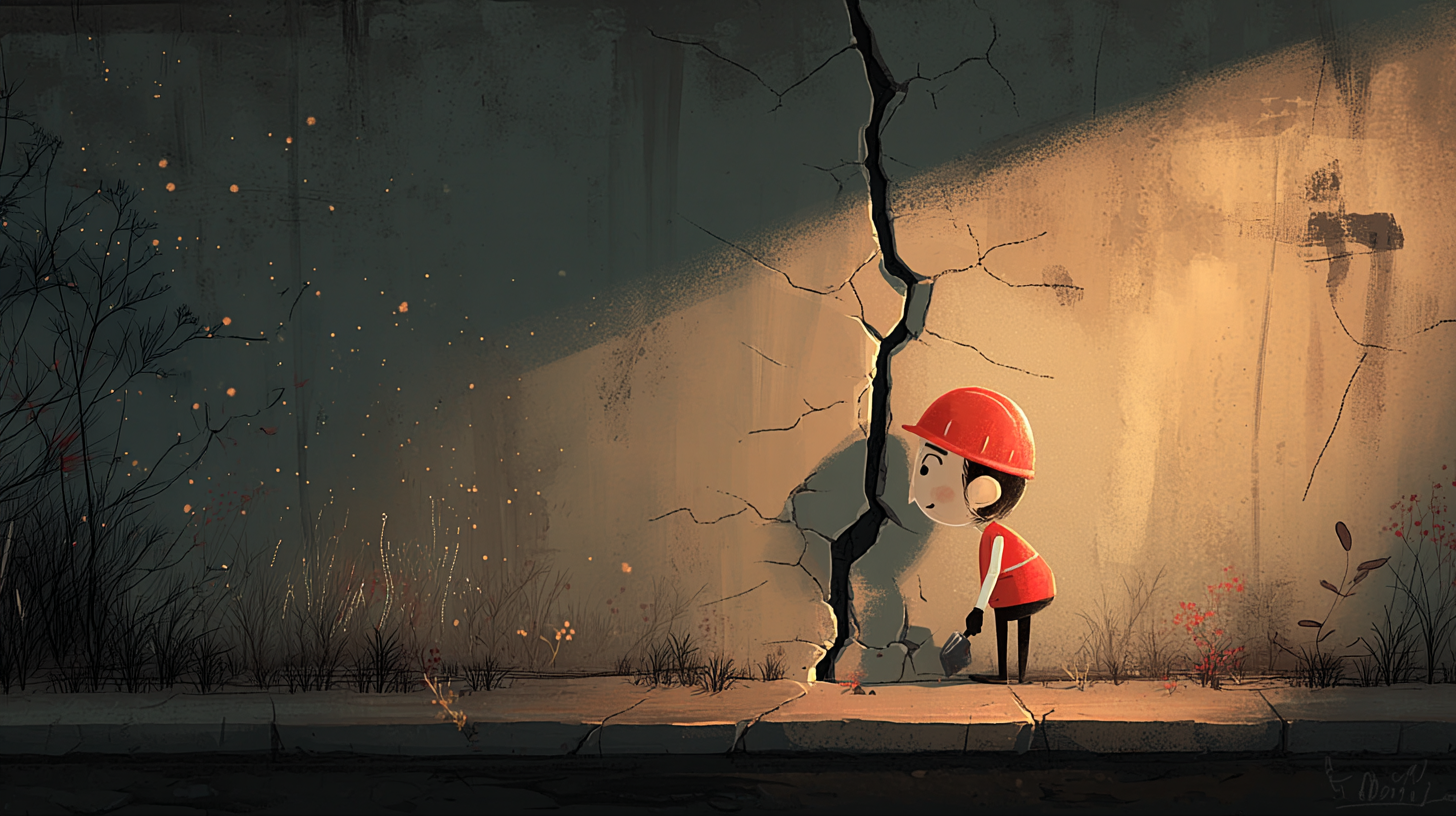“Crack” means something is a little broken, or someone is very good at something.
「crack」は、物が少しだけ割れること、またはすごく上手な人のことを言うよ。
以下は英単語 “crack” に関するストーリー型学習コンテンツです。まずは大枠の意味を理解して最後の文章で確認しましょう。
主な意味(main meaning)
| 品詞 | 定義(英語) | 例文 | 発音記号(IPA) |
|---|---|---|---|
| 動詞 (verb) | to break something slightly without separating it completely | She cracked the egg into the bowl. | /kræk/ |
| 名詞 (noun) | a small break or line on the surface of something | There is a crack in the wall. | /kræk/ |
| 形容詞 (adjective, informal) | very good or excellent at something | He is a crack pilot in the air force. | /kræk/ |
語源(etymology)
“Crack” は古英語 cracian に由来し、「鋭くはじける音を出す」や「割れる」という意味がありました。音や力で何かが「パキッ」と割れるイメージが中心です。
類義語(synonyms)
| 類義語 | 例文 |
|---|---|
| split | The wood split when I hit it with an axe. |
| fracture | He fractured his arm while playing soccer. |
| break | I accidentally broke the glass. |
| shatter | The window shattered in the storm. |
| snap | The twig snapped under my foot. |
反義語(antonyms)
| 反義語 | 例文 |
|---|---|
| fix | He fixed the broken chair. |
| mend | She mended the cracked vase carefully. |
コロケーション(collocations)
| コロケーション | 例文 |
|---|---|
| crack a joke | He cracked a joke to ease the tension. |
| crack the code | They finally cracked the secret code. |
| crack open | She cracked open the book to read. |
| hairline crack | There is a hairline crack in the mirror. |
| crack under pressure | He cracked under pressure during the exam. |
2項表現(binomials)
| 2項表現 | 例文 |
|---|---|
| black and crack | The black and crack lines showed the vase was old. |
| snap and crackle | I heard the snap and crackle of the fire. |
英語ストーリー(english story)
Title: The Crack in the Wall
Tom was a crack (very good) engineer at a small construction company. One morning, his boss called him urgently. “There’s a crack (small break) in the main wall of the new shopping mall. We need you to check it immediately.”
Tom arrived at the site with his tools. He examined the crack carefully. “It’s just a hairline crack,” he said. “But if we don’t fix (opposite of crack) it now, it could become worse.”
As he worked, he cracked a joke to calm the worried workers. “Don’t worry, I’m not going to let this mall fall apart!” Everyone laughed, feeling more relaxed.
Later, Tom explained, “This happens when buildings crack under pressure from weak foundations. We’ll mend (repair) it and check the structure again.”
A young worker asked, “How did you crack the code (solve the problem) so fast?”
Tom smiled. “Experience. And listening to the walls—every crack tells a story.”
Thanks to Tom’s quick response, the shopping mall opened on time, and he earned the title of a crack (excellent) engineer once more.
和訳
壁のヒビ
トムは小さな建設会社で働く優秀な(crack)エンジニアでした。ある朝、上司が急いで彼を呼び出しました。「新しいショッピングモールのメインの壁にヒビ(crack)が入っている。すぐに確認してくれ。」
トムは道具を持って現場に到着し、ヒビを注意深く調べました。「これは髪の毛ほどの小さなヒビ(hairline crack)です。でも、今直さなければ悪化します。」
作業中、彼はみんなを安心させるために冗談(crack a joke)を言いました。「心配しないで。このモールをバラバラにするつもりはないよ!」皆が笑って、少し安心しました。
その後トムは言いました。「これは建物が基礎の弱さによってプレッシャーでヒビ(crack under pressure)が入るんだ。直して(mend)もう一度構造をチェックするよ。」
若い作業員が尋ねました。「どうやってそんなに早く問題を解決(crack the code)したんですか?」
トムは笑って言いました。「経験だよ。そして壁の声を聞くこと――どんなヒビも物語を語るんだ。」
トムの素早い対応のおかげでモールは予定通りにオープンし、彼は再び優秀な(crack)エンジニアとして認められました。
Q&A
“crack” と “split” はどう違いますか?
「crack」は表面に細かい線が入るような“ひび”を表し、完全には分かれていません。一方、「split」は何かが物理的に2つ以上に“割れる”ことを指し、より大きな分離を示します。
“crack” と “fracture” の違いは?
どちらも「ひび」や「割れ」を意味しますが、「fracture」は特に骨や硬い物に使われる専門的・医学的な言葉です。「crack」はより一般的で、日常の物(ガラス、壁など)に使います。
“crack” と “break” の違いは?
「crack」は部分的な壊れ方、たとえばひびが入った状態を指します。「break」は完全に壊れること、たとえば何かが2つに折れたり割れたりすることを表します。
“crack” と “shatter” の違いは?
「crack」は表面に一本または数本の線が入る程度の壊れ方です。「shatter」はものがバラバラに粉々に砕けるような壊れ方で、もっと激しい破損を指します。
“crack” と “snap” の違いは?
「snap」は音に注目した言葉で、急に“ポキッ”と折れるような小さな物(枝や鉛筆など)に使います。「crack」も音と関係することがありますが、通常は表面のひびや割れを示します。
“crack a joke” とただの “joke” の違いは?
“crack a joke” は「冗談を言う」という自然な口語表現で、特に場を和ませるときに使います。単に “joke” というと「冗談そのもの」を指します。
“crack the code” と “solve the problem” の違いは?
どちらも「解決する」という意味ですが、“crack the code” は「難解な謎や秘密を解く」ニュアンスが強く、特に知的な挑戦に使われます。“solve the problem” はもっと広い意味で、日常的な問題にも使えます。
“crack under pressure” は具体的にどういう意味?
これは比喩的な表現で、「強いストレスやプレッシャーに負けて、冷静さを失うこと」を意味します。人の心や精神状態について使われることが多いです。



コメント